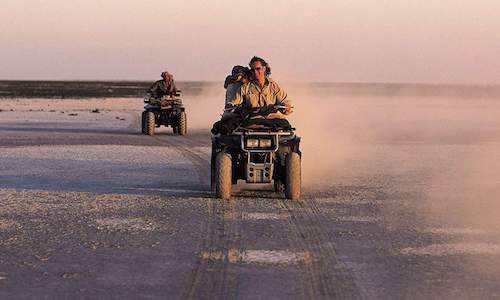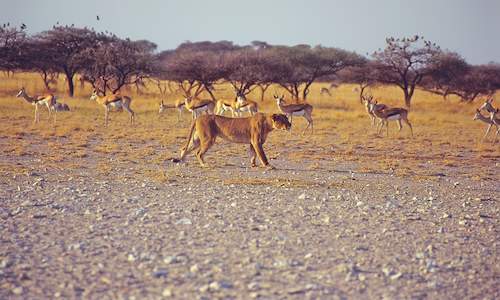Makgadikgadi and Nxai Pans
Botswana Travel Guide
© Quad-biking and Sundowners on Nxai Pan
The
two main pans of Nxai are large, open grass-covered stretches studded with mopane, acacia and baobab trees (notably the seven known as Baines' Baobabs, first painted by the explorer Thomas Baines in 1862). The whole area was once part of an ancient super-lake.
Herds of migratory zebra and wildebeest increase predator numbers (lion, cheetah and hyaena). Giraffe, buffalo, elephant and various antelope, including
desert-adapted Gemsbok and Springbok. December - February, the rain-filled pans host thousands of migrant flamingos and other waterbirds, such as pelicans, spoonbills, waders and storks.
The sensation of vast open space, timelessness and complete nothingness. Flamingos on Sowa and other pans, and the variety of easily seen wildlife.
Lodges and camp sites at Nata and in Makgadikgadi and Nxai pans, a rest camp/motel and camping ground at Gweta.
Spend 7 days discovering Makgadikgadi, Okavango & Linyanti
Quad Biking in the Makgadikgadi Racing into the Void
There is nothing quite like it - roaring over the Makgadikgadi Pans in Botswana on a quad bike is exhilarating and unforgettable. Nothing will grow on the salty sands and staring at this endless 'moonscape' will blow the cobwebs from your mind in one fell swoop.Understanding the Makgadikgadi means coming to terms with the deafening silence and complete isolation, only then will you enjoy the unique opportunity for self-discovery. You'll enjoy a unique sense of freedom when you rev your engine and laugh wildly into the wind!
You can share this soul-searching adventure with a guide and fellow travellers on a quad bike safari. Together, you will race into the void at great speed, arriving... nowhere. The Makgadikgadi Pans stretch for as far as the eye can see - an endless sweep of white nothingness that meets the clear blue horizon.
The Makgadikgadi forms part of the Kalahari Basin, located in the central region of Botswana and consists of a number of pans. The area it covers is about the size of Portugal. It was an enormous lake in the ancient past but when that dried up these dazzling white pans were all that remained.
The Makgadikgadi is extremely arid and waterless for most of the year and it is hard to see how anything can survive, yet you'll see evidence of stone-age habitation and spot smaller creatures that have adapted to life in such extremes. When the rains do come, the pans are totally transformed, attracting abundant game, predators, thousands of Pink Flamingos and other astounding bird species.
Quad Bike Safaris
The aridity of the landscape and lack of scenic landmarks should have been a major deterrent for intrepid explorers of old - but a few brave souls persevered and lived to tell the tale. David Livingstone was one, and the inspiration for Jacks Camp, Jack Bousfield was another.
Jack's Camp offers 1940's East African inspired style in roomy tents set into a palm grove. Enjoy colonial elegance in rich colours that contrasts with the surroundings and a plunge pool. San Camp adjoins the Makgadikgadi National Park with its rolling grasslands and features beautiful white tents for exclusive dining around a large table, taking tea and yoga sessions. Enjoy romance and seclusion at the edge of the pan.
At both camps you will explore the pans on 4wd quad bikes, visiting remote sites and investigating fossil beds, amongst other superb activities such as walks with Bushmen, guided game drives (including night drives) and frolics with habituated but still wild Meerkats. You could see the shy Brown Hyena and other species found in this region such as Gemsbok and Aardvark.

Makgadikgadi salt pans along with the Nxai Pans are believed to be the largest in the world. They appear mostly as glaring, white, endless p...
more
Nxai Pan in Botswana has been formed by a process that may have begun more than five million years ago. The Nxai Pan National Park offers sp...
more



 Makgadikgadi salt pans along with the Nxai Pans are believed to be the largest in the world. They appear mostly as glaring, white, endless p...
Makgadikgadi salt pans along with the Nxai Pans are believed to be the largest in the world. They appear mostly as glaring, white, endless p... Nxai Pan in Botswana has been formed by a process that may have begun more than five million years ago. The Nxai Pan National Park offers sp...
Nxai Pan in Botswana has been formed by a process that may have begun more than five million years ago. The Nxai Pan National Park offers sp...